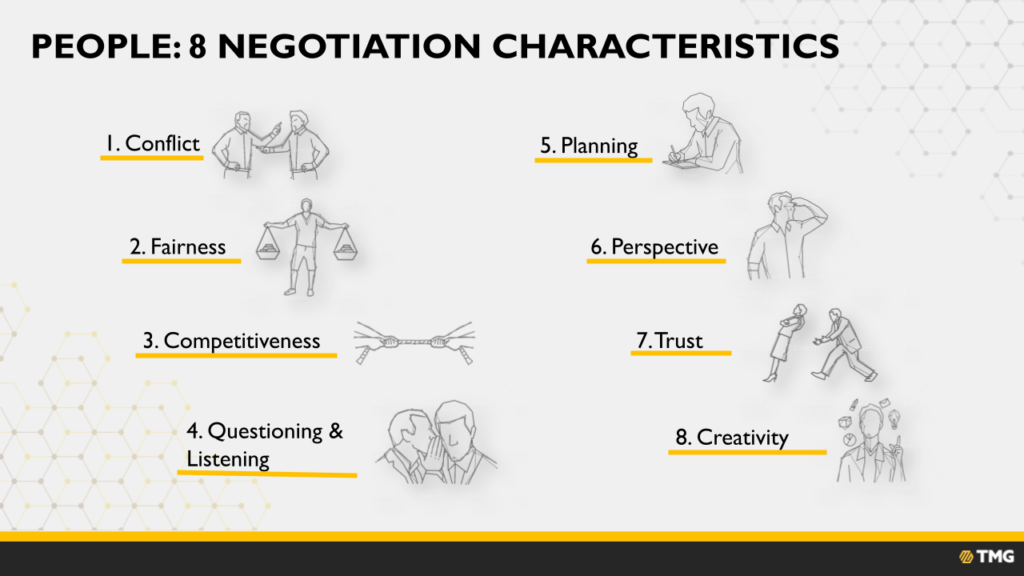Good negotiators are often thought of as the cornerstones of an organization. The success of most companies relies heavily on how skilled their negotiators are.
But what makes a good negotiator?
While it may seem like some people were born negotiators, the reality is that skilled negotiation techniques can be taught.
At The Maker Group, we’ve narrowed it down to eight key characteristics that make a good negotiator even better.
Table of Contents
- What Are Some Qualities of a Good Negotiator?
- The Maker Group’s View on What Characteristics To Have as a Negotiator
- What Negotiation Tactics Should a Good Negotiator Avoid?
- The Maker Group: Elevating Negotiators From ‘Good’ to ‘Great’
What Are Some Qualities of a Good Negotiator?
When it comes to negotiation, there are a few qualities that stand out as necessary to be successful. Good negotiators:
- Are not averse to conflict
- Stay objective
- Collaborate, rather than compete
- Ask questions and actively listen
- Plan proactively
- See other perspectives
- Gain trust when needed
- Get creative
Mastering these traits is essential to becoming a top negotiator.
The Maker Group consists of a team of expert negotiators from every field. Our consulting solutions, pragmatic developmental workshops, and tailored-to-you training help our clients achieve their objectives and increase profitability.
Using proven behavioral psychological models, we combine both strategic and behavioral elements of negotiation to answer the “what” and the “why” regarding effective negotiation execution. You’ll never be left wondering what makes a good negotiator with our 8-Step Maker Framework.
Below, we share a glimpse into the eight qualities that make a good negotiator great.
The Maker Group’s View on What Characteristics To Have as a Negotiator

#1: Not Averse to Conflict
Every negotiation has an element of conflict. However, it’s human nature for people to shy away from conflict, or try to lessen the conflict by giving in or capitulating to the other party.
When one party easily concedes during a negotiation, it usually means that they’ve given away something of value in the deal.
Learning how to stay cool-headed during a conflict — while safeguarding what matters most — is an essential trait every negotiator should possess to ensure a win-win outcome.
#2: Doesn’t View Negotiations as ‘What’s Fair Is Fair’
All’s fair in love and war, right? The same goes for negotiations — most of the time.
Effective negotiators don’t let their internal sense of fairness dictate their behaviors. Instead, negotiators should try to operate objectively to achieve the best outcome they can for themselves.
Putting fairness ahead of objectivity usually causes people to make concessions to the other party, which can ultimately lead to a loss in profitability.
#3: Appreciates Collaboration Over Competition
Negotiations are not a win-lose affair. Many people enter negotiations with a “me vs. them” attitude and think they must win to be successful.
The truth is, most negotiations — especially in the corporate world — are collaborative in nature. There’s more value in working with the other party, rather than operating in a distributive way.
Some people are born competitors, while others are born collaborators. Knowing where you fall on that spectrum will allow you to reign in your competitive spirit when negotiating.
Negotiations shouldn’t end with a winner and a loser. Remembering this point may help turn competition into collaboration.
#4: Comfortable Answering & Asking Questions
Questions are important. But even more important than the questions themselves, are the answers.
The ability to ask open-ended questions and actively listen to the answers is critical in negotiation.
But, often, negotiators are asking the wrong questions, or they fail to ask questions for reasons such as:
- Not planning in advance
- Worrying about what the other party will think
- Not wanting to look ill-prepared or unintelligent
However, operating under assumptions without vetting those assumptions first can cause you to fall short in a negotiation. Asking questions shows the other party that you care about their thoughts on the negotiation, making it more likely that they’ll open up to you.
Coming prepared to ask questions is one thing, but preparing for various answers is a whole other level. This is how negotiators can quickly gain the upper hand.
#5: Is a Proactive Planner
About 90% of negotiation is in the planning. This is why consistency is key when it comes to preparing and planning a negotiation.
Imagine you have 30 negotiators doing it in 30 different ways. How will you assess your success or know if your team is properly prepared without a consistent planning process?
Having a step-by-step system of planning prepares negotiators to react effectively during the negotiation.
The Maker Group 8-Step Maker Framework ensures that every negotiator is taking actionable steps toward preparing for negotiation.
Not only does a unified planning process provide organizations with the consistency needed to perform every negotiation successfully, but it also puts accountability on both the negotiator and the manager to ensure every step has been taken during contract negotiations.
#6: Has the Ability To See Things From Other Perspectives
As a negotiator, putting yourself in the other party’s shoes can help you gain an important perspective and allow you to see things from a different lens.
Oftentimes, negotiators can get caught up in what matters to them for various reasons, such as a promotion or bonus that’s on the line, or the expectations of their manager or organization.
When you enter a negotiation with only your needs in mind, you’ll always feel at a disadvantage, or that you need the deal more than the other party.
Instead, consider the perspective of the other party involved. They’re likely dealing with the same concerns as you (a demanding boss, commission or bonuses, etc.).
With this perspective, you may learn that you have power in places you hadn’t considered.
#7: Understands When Trust Should Play a Role in a Negotiation & When It Shouldn’t
Trust and trustworthiness are important factors in many negotiations, but not all. If you lean into a negotiation with trust, without knowing if the other party is trustworthy, you could be taken advantage of.
By the same token, it’s important to watch out for people who try to infuse trust where trust isn’t required in the negotiation.
Extending trust in negotiations often leads to giving up valuable information that is important to the other party. If they don’t reciprocate, then you’ve given away your leverage and they’ll use that to their advantage.
In some cases, trust can be built and maintained. In other cases, negotiators must get comfortable operating in an environment without trust.
#8: Knows the Importance of Creativity
We like to refer to creativity as “taking the blinders off.” In corporate negotiations, it’s common for seasoned negotiators to employ the same tactics time and time again.
However, thinking outside the box can add a lot of value to a deal.
Before entering into a negotiation, consider what variables are important or interesting to the other party and how you can use these to create leverage.
During the planning stages, brainstorm new ways to work with long-time clients. Just because you’ve been doing it one way for many years, doesn’t mean it’s been the right way.
Take the time to get creative, and you may surprise yourself with what you come up with.
What Negotiation Tactics Should a Good Negotiator Avoid?
A good negotiator will possess the eight characteristics listed above. But are there tactics and techniques in negotiation that should be avoided? Absolutely.
When entering into or engaging in negotiation, avoid the following ten mistakes:
- Poor planning or “going in blind”
- Making extreme demands
- Neglecting the other party’s perspective
- Using aggressive or accusatory language
- Losing sight of your values
- Negotiating against your best interests
- Exaggerating or misrepresenting the facts
- Take-it-or-leave-it strategies
- Rushing the process
- Not knowing your BATNA (best alternative to a negotiated agreement)
The Maker Group: Elevating Negotiators From ‘Good’ to ‘Great’
The Maker Group offers workshops, training, and consulting services to negotiators in every industry.
Our team of expert commercial negotiators has experience negotiating complex, high-value deals in every industry. Our real-world strategies and proven methodologies give your team of negotiators the confidence they need to tackle any problem.
Having serviced some of the largest companies in the world with best-in-class support and solutions, The Maker Group’s team knows your world and understands your challenges. We can help you achieve success in every deal.
Our focused, practical methodology is proven to drive profitability within any organization, and our proprietary Maker Framework process takes the guesswork out of planning and preparing for negotiations.
Are you ready to make your good negotiators great?
Call The Maker Group today.


